Chu Chen, Ph.D.
Professor
Education
B.S., Nanjing University, Nanjing, China
M.S., Zhejiang University School of Medicine, Hangzhou, China
Ph.D., Tulane University, New Orleans
Postdoctoral fellow, Louisiana State University Health Sciences Center, New Orleans
Research
The research programs in Dr. Chen’s laboratory have been focusing on neuroinflammation in health and disease. Neuroinflammation has been implicated in many brain disorders/diseases, including epilepsy, traumatic brain injury (TBI), stroke, amyotrophic lateral sclerosis (ALS), multiple sclerosis (MS), Parkinson’s disease (PD), and Alzheimer’s disease (AD). However, our understanding of the mechanisms underlying neuroinflammation in the pathogeneses and neuropathology of neurodegenerative diseases is still limited. Importantly, there are no effective therapies currently available to prevent development of neurodegenerative diseases or to halt disease progression. Research in Dr. Chen’s laboratory is in exploring cellular, molecular, and epigenetic mechanisms responsible for pathogenesis and neuropathology of AD and TBI-caused AD-like neuropathology and in identifying novel therapeutic targets for Alzheimer’s disease and TBI-induced neurodegenerative disease.
Lab Members
Lab Photos
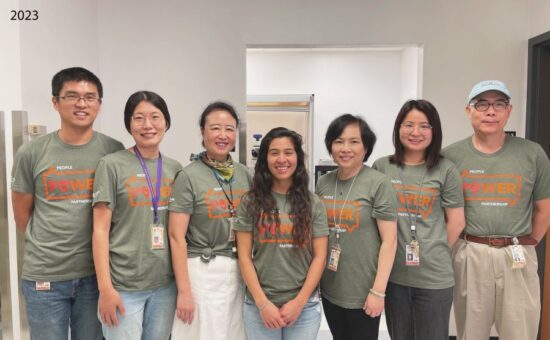 |
 |
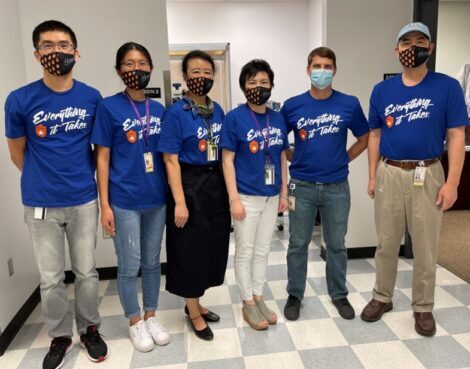 |
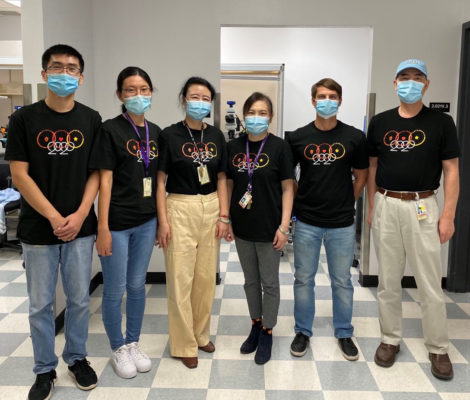 |
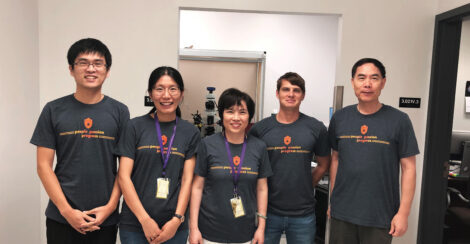 |
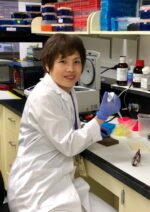 | Jian Zhang Laboratory Manager and Senior Research Associate Zhangj9@uthscsa.edu |
 | Dexiao Zhu, M.D. Instructor/Research Zhud@uthscsa.edu |
 | Fei Gao, Ph.D. Research Scientist Gaof1@uthscsa.edu |
 | Mei Hu, Ph.D. Research Scientist Hum1@uthscsa.edu |
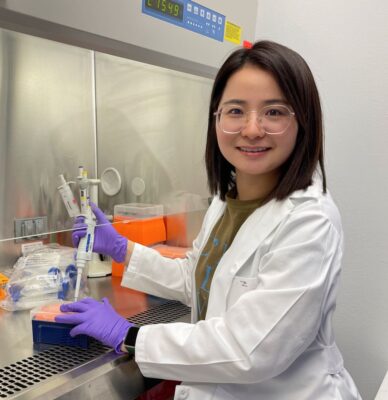 | Jianlu Lyu, Ph.D. Postdoctoral Research Fellow lyuj@uthscsa.edu |
 | Anastassia Nelson Research Associate NelsonAR@uthscsa.edu |
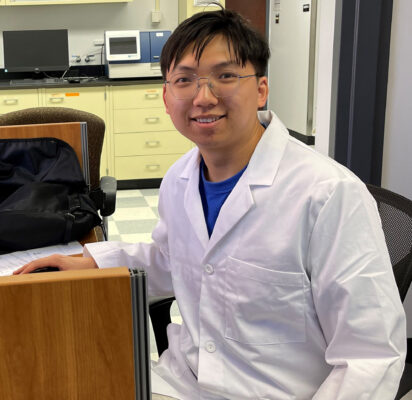 | Chudai Zeng Student Associate |
Publications
1. Chen C. (2024) TDP-43 is a key molecule accelerating development of Alzheimer’s disease following traumatic brain injury. Neural Regeneration Research 19(5):955-956. PMID: 37862186
2. Chen C. (2023) Inhibiting degradation of 2-arachidonoylglycerol as a therapeutic strategy for neurodegenerative diseases. Pharmacology & Therapeutics 244:108394. PMID: 36966972
3. Zhu D, Zhang J, Hashem J, Gao F and Chen C. (2023) Inhibition of 2-arachidonoylglycerol degradation enhances glial immunity by single-cell transcriptomic analysis. Journal of Neuroinflammation 20:17. PMID: 36717883
4. Zhu D, Zhang J, Gao F, Hu M, Hashem J and Chen C. (2023) Augmentation of 2-arachidonoylglycerol signaling in astrocytes maintains synaptic functionality by regulation of miRNA-30b. Experimental Neurology 361:114292. PMID: 36481187
5. Chen C. (2023) Endocannabinoid control of neuroinflammation in traumatic brain injury by monoacylglycerol lipase in astrocytes. Neural Regeneration Research 18: 1023-1024. PMID: 36254984
6. Gao F, Hu M, Zhang J, Hashem J and Chen C. (2022) TDP-43 drives synaptic and cognitive deteriorations following traumatic brain injury. Acta Neuropathologica 144: 187-210. PMID: 35713704
7. Hu M, Zhu D, Zhang J, Gao F, Hashem J, Kingsley P, Marnett LJ, Mackie K and Chen C. (2022) Enhancing endocannabinoid signaling in astrocytes promotes recovery from traumatic brain injury. Brain 145 (1): 179-193. PMID: 35136958 (Scientific commentary in the issue: https://academic.oup.com/brain/article/145/1/7/6555921 and covered by news media)
8. Hashem J, Hu M, Zhang J, Gao F, and Chen C. (2021) Inhibition of 2-arachidonoylglycerol metabolism alleviates neuropathology and improves cognitive function in a tau mouse model of Alzheimer’s disease. Molecular Neurobiology 58:4122-4133. PMID: 33939165
9. Song Y, Hu M, Zhang J, Teng Z and Chen C. (2019) A novel mechanism of synaptic and cognitive impairments mediated via microRNA-30b in Alzheimer’s disease. EBioMedicine 39:409-421 PMID: 30522932 (Highlighted in this issue)
10. Zhang J & Chen C. (2018) Alleviation of neuropathology by inhibition of monoacylglycerol lipase in APP transgenic mice lacking CB2 receptors. Molecular Neurobiology 55:4802-4810. PMID: 28733897
11. Zhang J, Teng Z, Song Y, Hu M & Chen C. (2015) Inhibition of monoacylglycerol lipase prevents chronic traumatic encephalopathy-like neuropathology in a mouse model of repetitive mild closed head injury. Journal of Cerebral Blood Flow & Metabolism 35: 443-453. PMID: 25492114
12. Zhang J, Hu M, Teng Z, Tang Y & Chen C. (2014) Synaptic and cognitive improvements by inhibition of 2-AG metabolism are through upregulation of microRNA-188-3p in a mouse model of Alzheimer’s disease. Journal of Neuroscience 34:14919-14933. (Featured article in this issue) PMID: 25378159 Editor’s Commentary: http://www.jneurosci.org/content/34/45/i.full. Highlighted in Nature Science-Business eXchange: http://www.nature.com/scibx/journal/v7/n46/full/scibx.2014.1354.html
13. Chen R, Zhang J, Fan N, Teng Z, Wu Y, Yang H, Tang Y, Sun H, Song Y & Chen C. (2013) Δ9-THC-caused synaptic and memory impairments are mediated through COX-2 signaling. Cell 155:1154-1165. PMID: 24267894 (Featured and highlighted in Cell : http://www.elsevier.com/connect/preventing-marijuana-induced-memory-problems-with-OTC-painkillers, Science: http://news.sciencemag.org/brain-behavior/2013/11/painkillers-may-curb-memory-loss-medical-marijuana, Science Signaling: (http://stke.sciencemag.org/cgi/content/abstract/6/304/ec291), Nature: (http://www.nature.com/nature/journal/v503/n7477/full/503440b.html), Nature Reviews Neuroscience: (http://www.nature.com/nrn/journal/v15/n1/full/nrn3659.html), and covered by various news media.
14. Chen R, Zhang J, Wu Y, Wang D, Feng G, Tang YP, Teng Z & Chen C. (2012) Monoacylglycerol lipase is a therapeutic target for Alzheimer’s disease. Cell Reports 2:1329-1339 PMID: 23122958 (Covered by various news media).
15. He H, Mahnke A, Doyle S, Fan N, Wang C, Hall B, Tang YP, Inglis F, Chen C & Erickson JD (2012) Neurodevelopmental role for VGLUT2 in pyramidal neuron plasticity, dendritic refinement, and in spatial learning. Journal of Neuroscience 32:15886-15901. PMID: 23136427
16. Xu J, Zhang J & Chen C. (2012) Long-lasting potentiation of hippocampal synaptic transmission by direct cortical input is mediated via endocannabinoids. Journal of Physiology (Lond) 590:2305-2315. PMID: 22411015
17. Du H, Chen X, Zhang J & Chen C. (2011) Inhibition of COX-2 expression by endocannabinoid 2-arachidonoylglycerol is mediated by PPAR-g. British Journal of Pharmacology 163:1533-1549. PMID: 21501147
18. Chen C. (2010) COX-2’s new role in inflammation. Nature Chemical Biology 6: 401-402. PMID: 20479749

